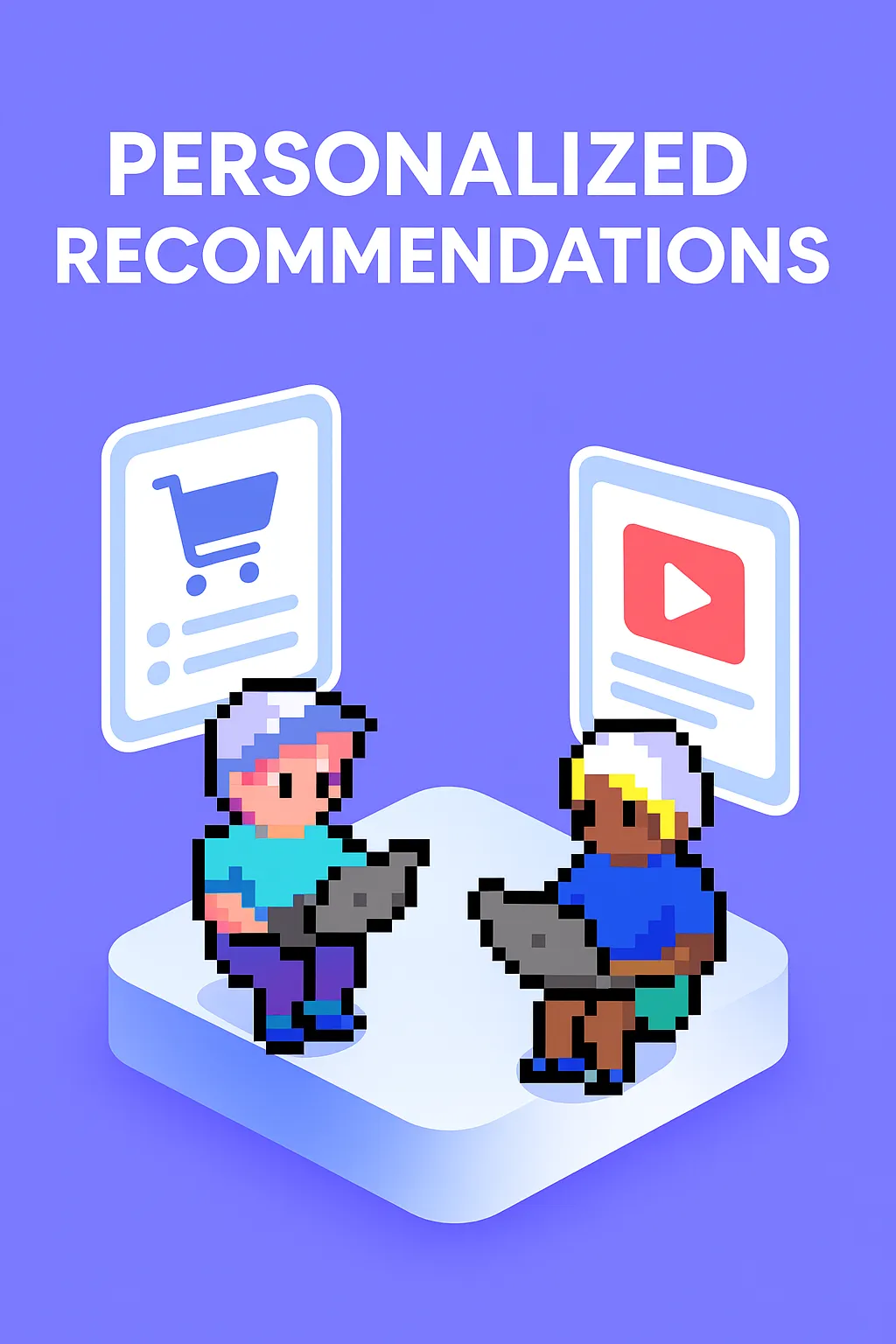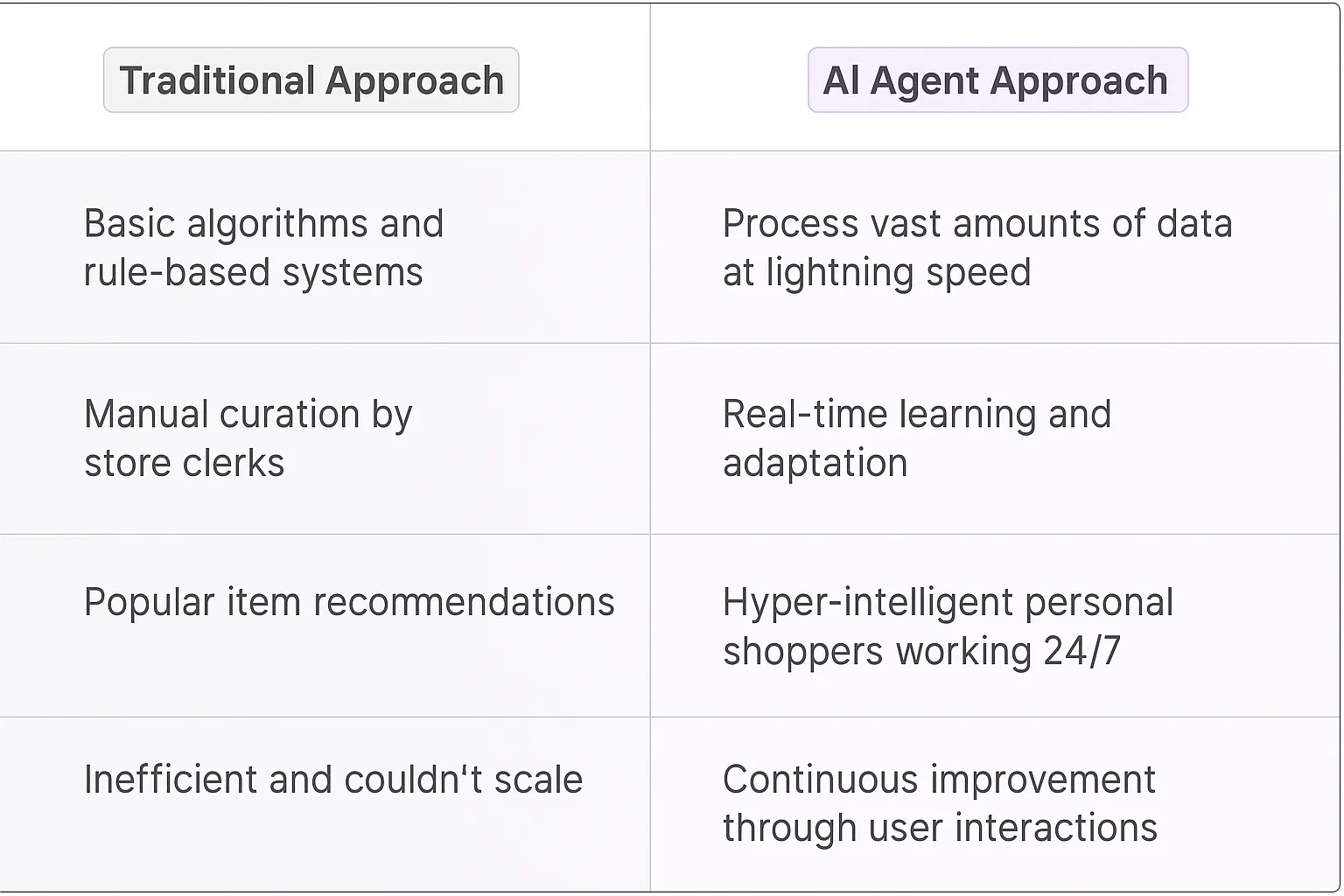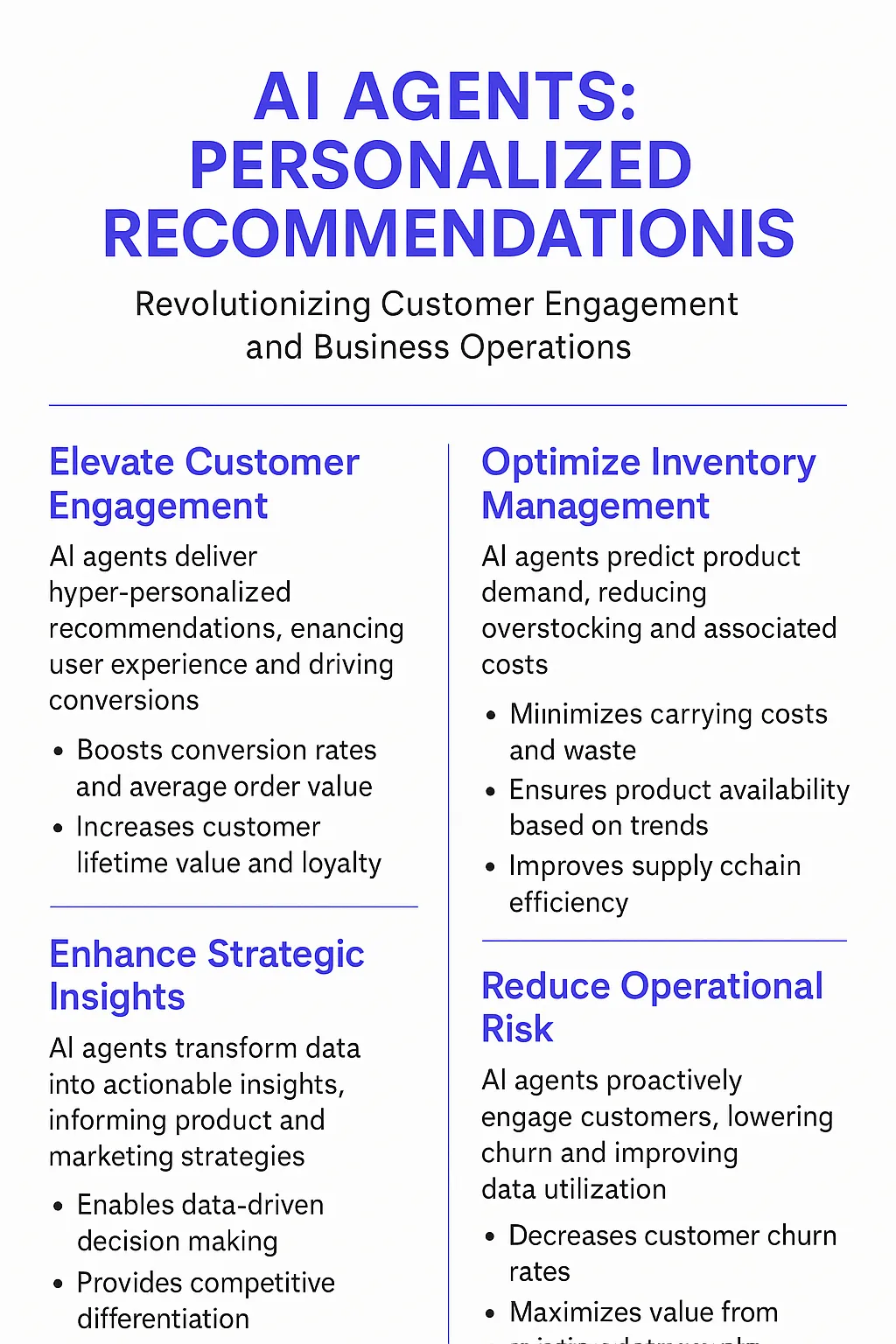Personalized Recommendations AI Agents
The Power of AI-Driven Personalized Recommendations
What is Personalized Recommendations?
Personalized recommendations are like having a million hyper-intelligent personal shoppers working 24/7 to find the perfect match for each user. These systems analyze user behavior, preferences, and contextual data to suggest products, content, or services that are most likely to resonate with an individual. It's not just about pushing sales; it's about creating a curated experience that feels tailor-made for each user.
Key Features of Personalized Recommendations
The secret sauce of personalized recommendations lies in their ability to process and analyze vast amounts of data at lightning speed. They don't just look at your last purchase; they consider your browsing history, purchase patterns, demographic info, and even subtle behavioral cues. These systems learn and adapt in real-time, creating a virtuous cycle of continuous improvement. The result? Recommendations that feel eerily spot-on, leading to higher engagement, increased customer satisfaction, and better conversion rates.

Benefits of AI Agents for Personalized Recommendations
What would have been used before AI Agents?
Before AI agents entered the scene, personalized recommendations were like throwing darts in the dark. Companies relied on basic algorithms, rule-based systems, and manual curation. It was the digital equivalent of a store clerk recommending products based on what's popular or what they personally like. These methods were inefficient, often missing the mark, and couldn't scale to meet the demands of millions of users.
The old approach was like trying to solve a Rubik's cube blindfolded. You might get lucky occasionally, but more often than not, you'd end up with a jumbled mess. Businesses were leaving money on the table, and users were drowning in irrelevant content.
What are the benefits of AI Agents?
Enter AI agents for personalized recommendations, and suddenly we're playing a whole new game. These digital teammates are like having millions of hyper-intelligent, tireless personal shoppers working 24/7 to find the perfect match for each user.
First off, AI agents can process and analyze vast amounts of data at lightning speed. They're not just looking at what you bought last week; they're considering your browsing history, purchase patterns, demographic info, and even subtle behavioral cues. It's like they have a sixth sense for what you might want before you even know you want it.
But here's where it gets really interesting: AI agents don't just analyze data; they learn and adapt in real-time. Every interaction, every click, every purchase feeds back into the system, making it smarter and more accurate. It's a virtuous cycle of continuous improvement that traditional systems could only dream of.
The result? Recommendations that feel almost eerily spot-on. We're talking about the kind of suggestions that make users think, "Wow, how did they know?" This level of personalization leads to higher engagement, increased customer satisfaction, and, crucially, better conversion rates.
For businesses, this translates to more efficient inventory management, reduced marketing costs, and increased customer lifetime value. It's like having a crystal ball that tells you exactly what your customers want, when they want it, and how to present it to them.
But perhaps the most exciting aspect is the potential for discovery. AI agents can identify patterns and connections that humans might never see, leading to serendipitous recommendations that delight users and open up new revenue streams for businesses.
In the end, AI agents for personalized recommendations aren't just an incremental improvement; they're a paradigm shift. They're turning the art of recommendation into a science, and in doing so, they're reshaping how we interact with products, content, and services online. It's not just about selling more stuff; it's about creating experiences that feel tailored, relevant, and valuable to each individual user.

Potential Use Cases of AI Agents for Personalized Recommendations
Processes
Personalized recommendation AI agents are game-changers in the digital landscape. They're not just fancy algorithms; they're the secret sauce behind user engagement and retention. These digital teammates analyze vast amounts of user data, behaviors, and preferences to serve up tailored content that keeps users coming back for more.
One key process these agents excel at is collaborative filtering. They look at what similar users have enjoyed and use that information to make educated guesses about what you might like. It's like having a friend who knows everyone's tastes and can always suggest the perfect movie or book.
Another critical process is content-based filtering. Here, the AI digs deep into the characteristics of items a user has interacted with and finds similar items. If you've been binging on sci-fi shows with strong female leads, it'll find more content that fits that bill.
Tasks
When it comes to specific tasks, personalized recommendation AI agents are versatility incarnate. In e-commerce, they can analyze your browsing history, past purchases, and even the time you spend looking at certain products to suggest items you're likely to buy. It's not just about pushing sales; it's about creating a curated shopping experience that feels tailor-made.
For streaming platforms, these agents are the unseen curators of your entertainment diet. They track what you watch, when you watch it, and even where you pause or rewind. This data helps them serve up a homepage that's practically irresistible, filled with shows and movies that align with your viewing habits.
In the realm of social media, recommendation agents are the puppet masters behind your feed. They're constantly working to understand your network, your interactions, and the content you engage with most. The result? A feed that's addictively relevant, keeping you scrolling and interacting.
For news and content platforms, these AI agents are like personal editors. They sift through the noise to bring you articles, videos, and podcasts that align with your interests and reading habits. It's not just about what's popular; it's about what's relevant to you.
In the world of music streaming, recommendation agents are the DJs of the digital age. They create playlists that seem to read your mind, introducing you to new artists based on your listening history and the acoustic qualities of the songs you love.
The beauty of these AI agents lies in their ability to learn and adapt. Every interaction, every click, every purchase feeds into their understanding, making their recommendations increasingly accurate over time. It's a virtuous cycle of engagement that benefits both users and platforms.
As we move forward, the potential for these AI agents is boundless. Imagine them integrating across platforms, understanding not just your preferences within a single app, but your lifestyle as a whole. The future of personalized recommendations isn't just about suggesting products or content; it's about anticipating needs and enhancing daily life in ways we're only beginning to explore.

Industry Use Cases for Personalized Recommendations AI Agents
The power of personalized recommendations AI agents is reshaping how businesses connect with their customers across sectors. These digital teammates are becoming indispensable, offering tailored suggestions that feel almost prescient. Let's dive into some concrete examples of how different industries are leveraging this tech to create experiences that are both delightful and deeply relevant to their users.
From e-commerce giants fine-tuning product suggestions to streaming platforms curating the perfect playlist, these AI agents are quietly revolutionizing user experiences. They're not just improving conversion rates; they're fundamentally changing how we discover and interact with content and products. The following use cases illustrate how personalized recommendations are becoming the secret sauce in customer engagement strategies across various sectors.
Retail: The Next Frontier for Personalized Recommendation AI
Let's talk about the retail industry - a space ripe for disruption by personalized recommendation AI. We're not just talking about the "you might also like" suggestions you see on Amazon. This is next-level stuff.
Picture a digital teammate that knows your customers better than they know themselves. It's constantly learning from every interaction, every purchase, every abandoned cart. But here's where it gets interesting - it's not just looking at what customers buy, but how they buy.
This AI doesn't just recommend products; it recommends experiences. It might suggest a complete outfit for an upcoming event, factoring in the weather forecast, the customer's style preferences, and even their budget constraints. It could even go as far as recommending complementary items like accessories or makeup that match the outfit.
But here's the kicker - this AI isn't confined to the digital realm. It can integrate with in-store experiences too. Imagine a customer walks into a physical store, and the AI immediately recognizes them through their smartphone. It then sends personalized recommendations to the store associate's device, allowing for a seamless omnichannel experience.
This level of personalization isn't just about increasing sales (though it will). It's about creating a shopping experience so tailored and effortless that customers can't imagine going anywhere else. It's about turning casual shoppers into brand loyalists.
The potential here is enormous. We're talking about a fundamental shift in how retail operates. Stores that adopt this technology early will have a significant competitive advantage. Those that don't risk becoming obsolete.
This is the future of retail. And it's not as far off as you might think. The technology exists - it's just waiting for forward-thinking retailers to embrace it and push it to its limits. Who's going to be first?
Travel Industry: AI-Powered Personalization Takes Flight
The travel industry is on the cusp of a major transformation, and personalized recommendation AI is the catalyst. We're not talking about basic "here's a hotel you might like" suggestions. This is about crafting entire journeys tailored to individual preferences, behaviors, and even subconscious desires.
Think about an AI that doesn't just know where you want to go, but why you want to go there. It analyzes your past trips, social media activity, browsing history, and even your calendar to understand your travel motivations. Are you a thrill-seeker looking for your next adrenaline rush? A culture vulture hungry for immersive local experiences? Or maybe you're just desperate for some R&R away from your hectic life.
This AI goes beyond recommending destinations. It curates entire itineraries, considering factors like your fitness level, dietary restrictions, budget, and even your circadian rhythm to suggest optimal flight times. It might recommend a hidden gem of a restaurant that perfectly aligns with your culinary preferences, or a off-the-beaten-path attraction that resonates with your interests.
But here's where it gets really interesting: this AI learns and adapts in real-time. Say you're on a trip it planned, and you spontaneously decide to try skydiving. The AI notes this shift in behavior and adjusts future recommendations accordingly, perhaps suggesting more adventure activities on your next trip.
The implications for the travel industry are massive. Travel agencies and booking platforms that harness this technology will be able to offer a level of personalization that feels almost clairvoyant. They'll be able to anticipate needs before travelers even realize they have them, creating loyalty through prescience.
This isn't just about selling more trips or upselling premium experiences (although it will certainly do that). It's about fundamentally changing how people travel. It's about making every journey feel like it was crafted specifically for you - because, in a sense, it was.
The companies that nail this will own the future of travel. They'll turn occasional vacationers into travel addicts, always eager for their next perfectly tailored adventure. The race is on, and the potential rewards are enormous. Who's going to crack the code first?
Considerations
Technical Challenges
Building a personalized recommendations AI agent isn't just about slapping some machine learning on top of your product. It's a complex beast that requires careful thought and execution. One of the biggest technical hurdles is data quality and quantity. Your AI is only as good as the data it's fed, and in the world of recommendations, that means user behavior data. But here's the catch: users are weird, unpredictable creatures. Their actions don't always reflect their true preferences, and their tastes change over time.
Another technical nightmare is the cold start problem. How do you recommend stuff to new users who haven't interacted with anything yet? It's like trying to set up your friend on a blind date when you know nothing about their type. You could default to popular items, but that's a cop-out and doesn't provide real personalization.
Then there's the challenge of real-time processing. Users expect instant gratification. If your recommendations take more than a split second to load, you might as well not bother. Balancing speed with accuracy is a constant tug-of-war that keeps engineers up at night.
Operational Challenges
On the operational side, privacy concerns are the elephant in the room. Users want personalized experiences, but they also freak out when they feel like you're stalking them. It's a delicate dance of collecting enough data to be useful without crossing the creepy line. And with regulations like GDPR and CCPA, one misstep could land you in hot water.
Another operational headache is managing user expectations. When your AI gets it right, it's magic. But when it misses the mark, users can get frustrated fast. It's like dating - one bad recommendation, and they might swipe left on your entire platform.
Lastly, there's the challenge of explaining your recommendations. Users don't just want good suggestions; they want to know why they're getting them. But breaking down complex algorithms into user-friendly explanations is no small feat. It's like trying to explain quantum physics to your grandma - you need to simplify without dumbing it down too much.
In the end, building a killer personalized recommendations AI agent is as much art as it is science. It requires a deep understanding of human behavior, cutting-edge tech, and a dash of magic. Get it right, and you'll have users coming back for more. Get it wrong, and you'll be just another app gathering dust in the digital graveyard.
The Future of AI-Powered Personalization
Personalized recommendation AI agents are not just a nice-to-have; they're becoming a must-have for businesses looking to stay competitive in the digital age. They're reshaping how we discover products, consume content, and interact with services online. But implementing these systems comes with challenges - from technical hurdles like data quality and real-time processing to operational concerns around privacy and user expectations. The companies that can navigate these challenges and harness the full potential of AI-powered recommendations will be the ones that thrive in the next era of digital engagement. The future of personalization isn't just about suggesting products; it's about anticipating needs and enhancing daily life in ways we're only beginning to explore. The race is on, and the potential rewards are enormous. Who's going to crack the code first?













